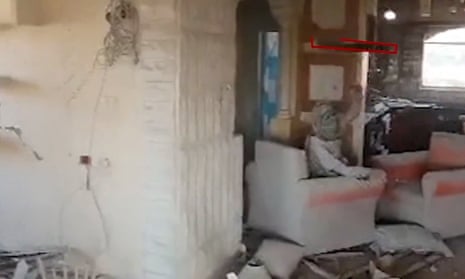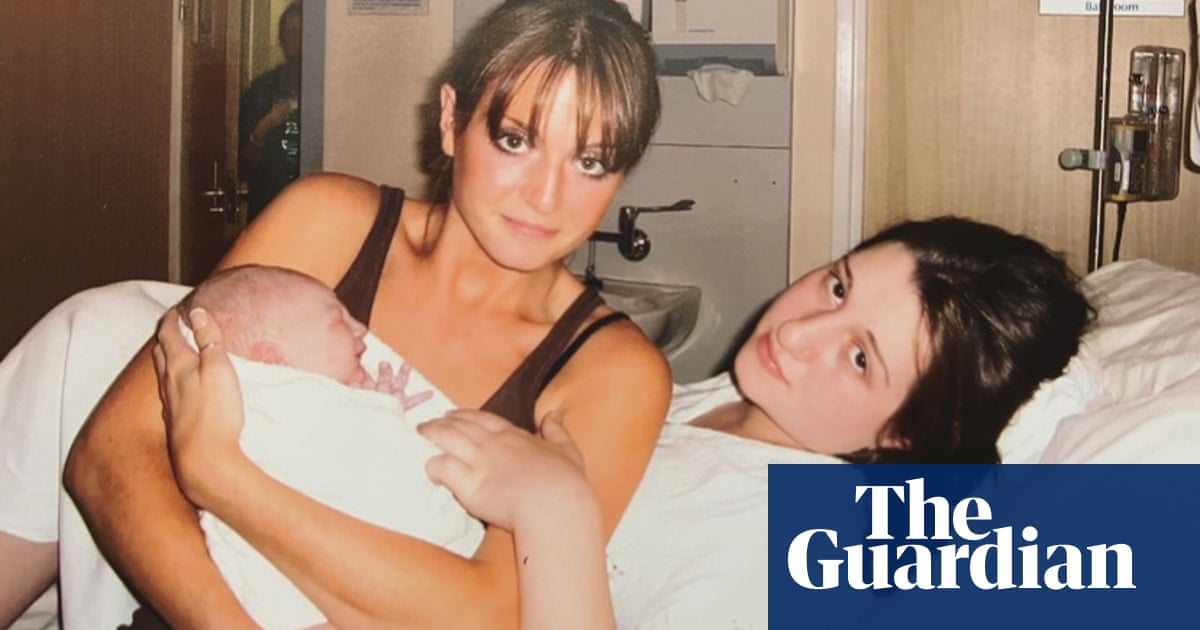Iran says manner of Sinwar’s death will strengthen ‘spirit of resistance’
Iranâs mission to the UN has said the circumstances of Yahya Sinwarâs death will strengthen the âspirit of resistanceâ.
Sinwar was apparently killed while fighting Israeli forces in Rafah, rather than hiding in a bunker as Israel had consistently portrayed him.

The Israeli military posted drone footage of the Hamas leader, apparently having lost part of his arm, sitting in an armchair wearing battle fatigues and a keffiyeh in a ruined apartment in Rafah. As he watches the drone, he throws an object at it.
It said in a statement posted on X, the Iranian UN mission said:
When US forces dragged a disheveled Saddam Hussein out of an underground hole, he begged them not to kill him despite being armed. Those who regarded Saddam as their model of resistance eventually collapsed.
When Muslims look up to Martyr Sinwar standing on the battlefield â in combat attire and out in the open, not in a hideout, facing the enemy â the spirit of resistance will be strengthened.
He will become a model for the youth and children who will carry forward his path toward the liberation of Palestine. As long as occupation and aggression exist, resistance will endure, for the martyr remains alive and a source of inspiration.
When U.S. forces dragged a disheveled Saddam Hussein out of an underground hole, he begged them not to kill him despite being armed. Those who regarded Saddam as their model of resistance eventually collapsed. However, when Muslims look up to Martyr Sinwar standing on the⦠pic.twitter.com/S1QUN47y83
— I.R.IRAN Mission to UN, NY (@Iran_UN) October 17, 2024
Key events
Former Israeli peace negotiator Daniel Levy, who is now the president of the US/Middle East Project, has said the killing of Yahya Sinwar will not make an end to the war in Gaza more likely, as Israeli prime minister Benjamin Netanyahu has âslammed shutâ any opportunity for a ceasefire. In an interview with Australiaâs ABC broadcaster Levy said:
âHe made it quite clear that the war on Gaza, on the Palestinians there, would continue and he set down a condition which everyone who hears this will immediately understand is not a negotiating, achievable thing, by saying that âif Hamas fighters want to come up with their hands up wave a white flag and give back the hostages then we can move forwardâ.
He said to the people of Gaza âwe are freeing youâ â those are the same people all of whom essentially have been displaced, many living under conditions of starvation, 40,000 killed, everything destroyed.
What he is setting down there is a position that, if anyone thought a crack had appeared, an opening to maybe say âmission accomplished, letâs do the deal, letâs also bring the Israelis homeâ â that was slammed shut straightaway despite American attempts to say âhey thereâs an opportunity hereâ.
Unfortunately itâs been slammed shut in everyoneâs face by the Israeli prime minister.
Charles Lister, an academic at the US-based Middle East Institute, suggests that Yahya Sinwarâs killing could make the situation of the remaining hostages âextremely fragileâ.
In a post on X he wrote:
There will be a Hamas desire for revenge.
Hostage families are rightfully putting pressure for a ceasefire already — but will Netanyahu listen? Unlikely.
With Yahya #Sinwar dead, the fate of the ~120 hostages currently in #Gaza has suddenly become extremely fragile. There will be a #Hamas desire for revenge.
Hostage families are rightfully putting pressure for a ceasefire already — but will #Netanyahu listen? Unlikely.
— Charles Lister (@Charles_Lister) October 17, 2024
Unrwa chief Philippe Lazzarini has refuted reports that one of the UN bodyâs workers was killed alongside Yahya Sinwar. In a post on X he wrote:
Earlier today, reports circulated on social & Israeli media that an UNRWA staff member was killed together with the Hamas head in Gaza. I confirm that the staff member in question is alive.
He currently lives in Egypt where he traveled with his family in April through the Rafah border. Time to put an end to disinformation campaigns.
Once again, unchecked information is used to discredit @UNRWA & its staff.
Earlier today, reports circulated on social & Israeli media that an UNRWA staff member was killed together with the Hamas head in Gaza.
I confirm that the staff member in question is alive. Heâ¦
— Philippe Lazzarini (@UNLazzarini) October 17, 2024
Israel has been at odds with the UN agency for decades, and Lazzarini has accused the Israeli government of trying to drive it out of existence.
Al Jazeera journalist shot by Israeli forces falls into coma
Al Jazeera journalist Fadi Al-Wahidi has fallen into a coma more than a week after being shot in the neck by an Israeli sniper in northern Gaza, the broadcaster has reported, adding that Israel has not responded to requests to allow his evacuation for medical treatment.
Al-Wadidi was wearing a vest that clearly marked him as a member of the press when he was shot last week while covering the Israeli siege of Jabalia refugee camp in northern Gaza.
Doctors at the Public Aid Hospital in Gaza City said they were unable to treat him and prevent complete paralysis, Al Jazeera reported on Thursday. The broadcaster wrote that he had suffered damage to his arteries, veins and shattered bones.
The attack on al-Wahidi came days after his Al Jazeera colleague, cameraman Ali al-Attar, was shot and severely wounded while covering the conditions of displaced Palestinians in Deir el-Balah in central Gaza.
Earlier this week three press freedom organisations â the Committee to Protect Journalists (CPJ), Free Press Unlimited (FPU), and Reporters Without Borders (RSF) â issued a rare joint appeal to Israel to allow the two journalists to be evacuated.
Palestinian scholar Jehad Abusalim condemned mainstream media for failing to offer solidarity to Al-Wahidi. In a post on X, he wrote:
It is a deep shame that a journalist who heroically documented one of this centuryâs most tragic episodes of ethnic cleansing and extermination receives no solidarity, no support, and no calls to save his life from major mainstream media outlets and institutions.
The world owes a debt to these journalists, who have risked their lives for over a year to cover one of the first wars in history where media coverage is tightly and severely restricted, with no international journalists allowed to enter or report from the Gaza Strip.
Today, the health condition of injured Palestinian journalist Fadi Al-Wahidi has deteriorated, and he has fallen into a coma.
Fadi was shot in the neck as he reported on the Israeli ground invasion of the Jabalia refugee camp in northern Gaza. He was wearing protective gear that⦠pic.twitter.com/9I9PFzR9xP
— Jehad Abusalim جÙاد أب٠سÙÙÙ (@JehadAbusalim) October 17, 2024
Who was Yahya Sinwar?

Jason Burke
Within days of the 7 October attacks last year, Israeli investigators had identified Yahya Sinwar, then the military leader of Hamas in Gaza, as the mastermind. To their increasing astonishment, they learned that not only had Sinwar conceived of what he called Operation al-Aqsa Flood but he had planned and organised the assault almost alone.
Only a handful of close aides had been let in on the plans, some with only days to go before the attack, in which about 1,200 people, mostly civilians, were killed and 250 abducted, and which triggered an Israeli offensive that has so far killed 42,500 people, also mostly civilians, and left swaths of Gaza in ruins.
Born in a refugee camp in Khan Younis, in the south of Gaza, to parents who had been forced to flee their homes in what became Israel in 1948, Sinwar was drawn into Islamist activism as a teenager. Across the Middle East, a religious resurgence was gathering momentum. As a science student at the Islamic University of Gaza in the early 1980s, Sinwar was drawn to Ahmed Yassin, a charismatic cleric who set up a local branch of the Muslim Brotherhood.
In 1987, Yassin drafted Sinwar into the newly created group Hamas and made him head of its nascent intelligence service. Duties included uncovering and punishing spies or other âcollaboratorsâ with Israel, as well as people in Gaza who infringed Hamasâs strict âmoralityâ codes. This Sinwar accomplished with implacable determination, confessing later to multiple murders of Palestinians.
Arrested in 1988 and given four life sentences for attempted murder and sabotage, he spent 22 years in Israeli jails. In prison, Sinwar refused to talk to any guards and personally punished inmates who did, pressing the face of one into a makeshift stove, according to one Israeli former interrogator who worked at the institution where Sinwar was held. âHeâs 1,000% committed and 1,000% violent, a very, very hard man,â the former interrogator said.
Read on below:
Many Palestinians reacting to the death of Yahya Sinwar have taken note of the fact that he died fighting. They have also noted that Israel has assassinated many generations of Palestinian leaders â but they have not managed to quash resistance, and new leaders have replaced the dead.
The prominent author Susan Abulhawa wrote in a post on X,
He died fighting on the front lines with his soldiers against zionist tyranny and barbarity. he was not hiding in a tunnel as they said. he certainly was not hiding in fortified buildings, comfortable in a suit and wealth. he died a martyr and hero in pursuit of freedom.
In a further post, she added:
They think the resistance dies with the martyrdom of leaders, as if the burning yearn for liberty, home and heritage in our chests can be extinguished when they break our hearts. farewell noble son.
Ali Abunimah, a Palestinian-American journalist and founder of the Electronic Intifada website, wrote that âhistory shows that martyrdom of leaders only ever strengthens the peopleâs determination to be free.â
In a separate post, he added:
If reports are correct, Yahya Sinwar died as he would wish, fighting honorably with and for his people, against the evils of Zionism, colonialism and genocide.
Israelis have been celebrating after news of Yahya Sinwarâs killing in Gaza:
At least 28 Palestinians killed in Israeli strike on Gaza school

Bethan McKernan
At least 28 people have been killed in an Israeli airstrike on a school turned shelter in the Jabaliya neighbourhood of Gaza City, amid accusations Israel intends to forcibly expel the remaining population in a renewed ground campaign.
The bombing of Abu Hussein school in Jabaliya on Thursday killed 28, including doctors and several children, and injured dozens more, according to health officials, who warned the final toll was likely to be higher. Another 11 people were killed in two separate airstrikes in Gaza City, and it was unclear how many were killed in other strikes in central and southern Gaza.
The attack on the Jabaliya school also caused a fire. âThere is no water to extinguish the fire. There is nothing. This is a massacre,â said medic Medhat Abbas.
âCivilians and children are being killed, burned under fire.â
The Israeli military said the strike targeted militants from Hamas and Palestinian Islamic Jihad operating from within the school, claiming dozens of fighters were present when the strike took place. In a statement, Hamas denied any militants were using the school as a base.
Thursdayâs attacks came as Israelâs latest campaign in Jabaliya, a district of Gaza City, reaches its second week. An estimated 400,000 people are trapped by the fighting, with dwindling humanitarian supplies. Israel has nominally controlled Gaza City since the beginning of the year, but has repeatedly been forced to re-engage in areas under its control as Hamas has regrouped.
Hezbollah launching ‘new and escalatory phase’ in war against Israel
Lebanonâs militant group Hezbollah has said it is launching a new phase in its war against Israel, saying it has used precision-guided missiles against troops for the first time. AFP reports:
Hezbollah âannounces a transition to a new and escalatory phase in the confrontation with the Israeli enemy, which will be reflected in the developments and events of the coming days,â the group said in a statement.
The announcement came after the Israeli military on Thursday said its forces killed Yahya Sinwar, the leader of Hamas, which is a Hezbollah ally.
The statement, however, made no mention of the Hamas chief.
It said âhundreds of fighters…are fully prepared to counter any Israeli ground incursion into southern Lebanese villages,â noting that attacks against Israel have increased in recent days.
It said its rocket strikes continue âto escalate day by day,â with âprecision-guided ones…being deployed for the first timeâ.
Israel killed Hezbollahâs leader Hassan Nasrallah in a Beirut air strike on 27 September. It has has repeatedly called for Hezbollah to be pushed away from the border to ensure its citizens could return to their homes in northern Israel.
Earlier on Thursday, Hezbollah lawmaker Hassan Fadlallah said that the Israeli army was not fully in control of any village in south Lebanon.
The mother of one of the Israeli hostages being held by Hamas in Gaza has reacted to the news of Yahya Sinwarâs death by calling on prime minister Benjamin Netanyahu to reach a deal for their release.
Einav Zangauker, mother of Matan Zangauker, was quoted in the Haaretz newspaper as saying, âYou got your image of victory. Now reach a deal.â She added:
A year after the failure [on 7 October], this is the time to leverage the accomplishments and use [Sinwarâs] elimination to take a diplomatic step that will bring our loved ones back home …
If Netanyahu does not take advantage of the momentum and does not stand up now and take a new Israeli initiative, even at the cost of ending the war, it means that he has decided to abandon my Matan and the other hostages, with the aim of prolonging the war and entrenching his rule.
Drone footage shows apparent last moments of Yahya Sinwar
The Israeli military has released drone footage it says shows Hamas leader Yahya Sinwarâs final moments: alone in a ruined Gaza apartment with the walls blown out from shelling, sat hunched in a chair covered by dust, with his head and face obscured by a scarf.
With his right arm appearing severely wounded, the video shows Sinwar flinging a stick over his head in the direction of the approaching drone. The Guardian has not independently verified the footage.
When the footage was taken, Israeli military spokesperson Daniel Hagari said Sinwar was only identified as a fighter. The military then fired an additional shell at the building, causing it to collapse and kill him, Hagari said. He said Sinwar was found with a bulletproof vest, grenades, and 40,000 shekels ($10,707).
According to the Jerusalem Post, Hagari told reporters: âSinwar fled alone into one of the buildings. Our forces used a drone to scan the area, which you can see here in the footage Iâm presenting.â
âSinwar, who was injured in his hand by gunfire, can be seen here with his face covered, in his final moments, throwing a wooden plank at the drone,â he said.
âHe tried to escape and our forces eliminated him.â.
Hamas has not commented on the killing of Sinwar.
Photos circulating online showed the body of a man resembling Sinwar with a gaping head wound, dressed in a military-style vest, half buried in the rubble of a destroyed building.
Israeli officials said Sinwar was found by infantry soldiers searching an area in the Tal El Sultan area of southern Gaza on Wednesday, where they believed senior members of Hamas were located.
The troops saw three suspected militants moving between buildings and opened fire, leading to a gunfight during which Sinwar escaped into a ruined building.
Earlier on Wednesday, a Palestinian woman was reportedly shot dead by the Israeli military while she was picking olives with her family on their land near the northern West Bank city of Jenin.
The 60-year-old woman was shot in the chest with live ammunition, the Palestinian news agency Wafa reported, citing the director of the Red Crescent Society in Jenin, Mahmoud al-Saadi.
A Palestinian health ministry statement said Hanan Abdel Rahman Abu Salama âwas killed by (Israeli) occupation bulletsâ in Faqoua village.
âAn Israeli in military clothing arrived at the place in a white car and fired about 10 bullets at the Abu Salama family, who were picking olives on their land,â Faqoua village councillor Munir Barakat told AFP.
âA few days ago, the council published an invitation to the village residents to go to their agricultural lands to pick olives,â said Barakat.
He added that the shooting occurred near a wall erected by Israeli authorities in the area.
The Israeli military told AFP it was âcheckingâ the report.
Attacks by settlers and the Israeli military on Palestinians trying to harvest their olives have been particularly intense this year. UN experts this week warned that Palestinian farmers in the occupied West Bank were âfacing the most dangerous olive season everâ. In a report, it added:
Last year, Israel also seized more Palestinian land than in any year in the past 30 years.
Wafe reported that earlier on Wednesday settlers had also âopened fire on participants in an event organized by the Wall and Settlement Resistance Commission to help farmers from the village of Kafr al-Labad, east of Tulkarm, pick olives from their landsâ.
In other incidents this harvest season, settlers and the military had burnt and cut down olive trees, stolen the crop and prevented farmers from reaching their land, Wafa wrote.
Israeli violence in the West Bank has soared since Hamasâs attack on Israel in October last year. Since then, Israeli troops and settlers have killed at least 738 Palestinians in the West Bank including more than 100 children, according to the Ramallah-based health ministry.
During the same period, 23 Israelis, including 16 members of the Israeli military, have been killed in the West Bank.
Analysis: Sinwar killing seems down to chance, not planning

Julian Borger
In the end, after a year-long, multi-agency manhunt involving the latest technology, Israelâs best special forces and American assistance, Yahya Sinwar appears to have been killed by regular soldiers who had stumbled into him and had no idea whom they had killed.
According to the initial reports, they were not there on an assassination operation and had no prior intelligence that they could be in the vicinity of the elusive Hamas leader, architect of the 7 October attacks, the man Israel most wanted to kill. It was only after they took a closer look at his face and found identity documents on him that the troops realised they had got Sinwar.
Along the way, Israel Defense Forces (IDF) have smashed much of Gaza and are estimated to have killed more than 42,000 Palestinians, driving two million from their homes, a humanitarian disaster Sinwar set in motion with the sheer brutality of the initial surprise assault a year ago, killing 1,200 Israelis and taking 250 hostage.
Sinwarâs last reported sighting had been just a few days after the 7 October attack, when he appeared out of the subterranean gloom in a Gaza tunnel when a group of hostages were been held.
In fluent Hebrew, perfected over more than 22 years in an Israeli prison, Sinwar reassured them that they were safe and would soon be exchanged for Palestinian prisoners. One of the hostages, Yocheved Lifshitz, an 85-year-old veteran peace campaigner from the Nir Oz kibbutz, had no time for his show of concern for their welfare and challenged the Hamas leader to his face.
âI asked him how he wasnât ashamed to do something like this to people who had supported peace all these years?â Lifshitz told the Davar newspaper after her release following 16 days in captivity. âHe didnât answer. He was quiet.â
A video recorded on Hamas security cameras at about the same time, on 10 October, and found by the Israeli military some months later, shows Sinwar following his wife and three children through a narrow tunnel and disappearing into the murk.
Read more analysis here:
As the US pushes for a fresh round of diplomacy aimed at securing a ceasefire in Gaza, secretary of state Antony Blinken has been speaking to Qatari prime minister Mohammed bin Abdulrahman Al Thani, who has played a key role in negotiations.
In a statement after the phone call, the US state department said the pair had discussed âthe death of Yahya Sinwar and the need to redouble efforts to end the conflict and secure the release of hostagesâ.
Blinken also reaffirmed US commitment to a diplomatic resolution to Israelâs invasion of Lebanon.
In September the US had backed calls for a 21-day ceasefire in Lebanon, but in the wake of the killing of the Hezbollah leader, Hassan Nasrallah, appeared to greenlight Israelâs air and ground offensive.
Israeli prime minister Benjamin Netanyahu said after news of Sinwarâs death that âWe will not stop the warâ in Gaza.
Harris says Sinwar death ‘an opportunity to finally end the war in Gaza’

Robert Tait
Kamala Harris has hailed the death of Yahya Sinwar as an opportunity to finally end the war in Gaza and prepare for âthe day afterâ when Hamas no longer dominates the territory.
The US vice-president and Democratic nominee said âjustice has been servedâ with the death of the Hamas leader, adding that the US, Israel and the wider world were âbetter off as a resultâ.
Harris also pressed for an end to the year-long hostilities that have killed more than 42,000 people in Gaza and left a trail of destruction in the territory.
âHamas is decimated and its leadership is eliminated,â she said. âThis moment gives us an opportunity to finally end the war in Gaza.â The end of the conflict had to be accompanied by security for Israel, the release of the remaining hostages and an end to suffering in Gaza, she said.
She also hinted at her support for Palestinian statehood by saying it should herald Palestiniansâ rights to âdignity, security, freedom and self-determinationâ.
Her comments chimed with those of Joe Biden, who has been criticised by progressives for unstinting support for Israel even while Benjamin Netanyahu had ignored his entreaties to avoid civilian casualties and ease humanitarian suffering in the tiny coastal territory.
âIsrael has had every right to eliminate the leadership and military structure of Hamas,â Biden said in comments that appeared designed to answer criticisms of his support.
He said Sinwar had represented an âinsurmountable obstacleâ to a better future for Israelis and Palestinians. âThat obstacle no longer exists. But much work remains before us,â he said.
Biden said he would talk to Netanyahu and other Israeli leaders about âending this war once and for allâ.
Read the full story here:
Iran says manner of Sinwar’s death will strengthen ‘spirit of resistance’
Iranâs mission to the UN has said the circumstances of Yahya Sinwarâs death will strengthen the âspirit of resistanceâ.
Sinwar was apparently killed while fighting Israeli forces in Rafah, rather than hiding in a bunker as Israel had consistently portrayed him.
The Israeli military posted drone footage of the Hamas leader, apparently having lost part of his arm, sitting in an armchair wearing battle fatigues and a keffiyeh in a ruined apartment in Rafah. As he watches the drone, he throws an object at it.
It said in a statement posted on X, the Iranian UN mission said:
When US forces dragged a disheveled Saddam Hussein out of an underground hole, he begged them not to kill him despite being armed. Those who regarded Saddam as their model of resistance eventually collapsed.
When Muslims look up to Martyr Sinwar standing on the battlefield â in combat attire and out in the open, not in a hideout, facing the enemy â the spirit of resistance will be strengthened.
He will become a model for the youth and children who will carry forward his path toward the liberation of Palestine. As long as occupation and aggression exist, resistance will endure, for the martyr remains alive and a source of inspiration.
When U.S. forces dragged a disheveled Saddam Hussein out of an underground hole, he begged them not to kill him despite being armed. Those who regarded Saddam as their model of resistance eventually collapsed. However, when Muslims look up to Martyr Sinwar standing on the⦠pic.twitter.com/S1QUN47y83
— I.R.IRAN Mission to UN, NY (@Iran_UN) October 17, 2024
Opening summary
Hello and welcome to the Guardianâs live coverage of Israelâs wars on Gaza and Lebanon.
Iran has said that the circumstances of Yahya Sinwarâs death will strengthen the âspirit of resistanceâ, after the Israeli military (IDF) confirmed it had killed the Hamas leader in the southern Gaza town of Rafah.
A drone video released by the IDF appeared to show Sinwar, apparently severely injured, sitting in an armchair in a ruined apartment, wearing a keffiyeh and battle fatigues. He throws an object at the drone.
It said in a statement posted on X, Iranâs UN missions said:
When Muslims look up to Martyr Sinwar standing on the battlefield â in combat attire and out in the open, not in a hideout, facing the enemy â the spirit of resistance will be strengthened.
He will become a model for the youth and children who will carry forward his path toward the liberation of Palestine. As long as occupation and aggression exist, resistance will endure, for the martyr remains alive and a source of inspiration.
Meanwhile, the US signalled it would begin a new push for a ceasefire, with US vice president Kamala Harris stating that Sinwarâs killing was âan opportunity to finally end the war in Gazaâ and that it was âtime for the day after to beginâ.
She echoed similar comments from President Joe Biden, who said it was âtime for this war to end and bring these hostages homeâ as he arrived in Germany.
He added that he was âhopefulâ about the prospects of a ceasefire and would be sending secretary of state Antony Blinken to Israel in the coming four to five days to discuss securing Gaza and what the âday afterâ the war will look like.
In Lebanon, the militant group Hezbollah said it was launching a new and escalating phase in its war against Israel, and that it had used precision-guided missiles against troops for the first time.
Hezbollah âannounces a transition to a new and escalatory phase in the confrontation with the Israeli enemy, which will be reflected in the developments and events of the coming days,â the group said in a statement.
In other developments:
-
The Israel Defense Forces (IDF) said Sinwar had been âeliminatedâ in Tel Sultan, a neighbourhood of Gazaâs southernmost town, Rafah, on Wednesday. The bodies of three militants were taken to Israel for DNA and dental record testing. Sinwarâs death brings to an end to a year-long hunt for the mastermind of the 7 October attack on Israel that triggered the war in Gaza.
-
Israelâs Kan Radio reported that the Hamas leader had been killed âby chanceâ, and not as a result of intelligence gathering. Photos and video from the scene, broadcast on Israeli media, showed what appeared to be Sinwarâs body lying in a pile of rubble on the floor of a destroyed building.
-
Hundreds of people gathered in Tel Aviv to call for the release of hostages held in Gaza after the news of Sinwarâs assassination broke.
-
The UK prime minister, Keir Starmer, said his country âwill not mournâ Sinwarâs death, as he called for the release of hostages, an immediate ceasefire and an increase in humanitarian aid into Gaza. The head of the European Commission, Ursula von der Leyen, said his death âis certainly weakening Hamasâ. Franceâs president, Emmanuel Macron, said he was thinking âwith emotion of the victimsâ of the 7 October Hamas attacks for which Sinwar was the mastermind. Germanyâs foreign minister, Annalena Baerbock, called on Hamas to âimmediately release all hostages and lay down its arms, the suffering of the people of Gaza must finally endâ. Antonio Tajani, Italyâs foreign minister, said he hoped that that Sinwarâs killing âwill lead to a ceasefire in Gazaâ.
-
At least 28 people were killed in an Israeli airstrike on a school turned shelter in the Jabaliya neighbourhood of Gaza City on Thursday. Among those killed in the bombing of Abu Hussein school included doctors and several children, according to health officials, who warned the final toll was likely to be higher. The attack on the Jabaliya school also caused a fire.
-
Another 11 people were killed in two separate airstrikes in Gaza City on Thursday, as Israelâs latest campaign in Jabaliya, a district of Gaza City, reaches its second week. Jabaliya residents said on Thursday that several streets were blown up in bombings, by tank fire and controlled detonations, and that Jabaliya, together with the northern towns of Beit Hanoun and Beit Lahia, are now under a complete siege. An estimated 400,000 people are trapped by the fighting, with dwindling humanitarian supplies.
-
The entirety of northern Gaza is under Israeli evacuation orders. Among those who have remained in the north are disabled or elderly people and their families, who say it is too dangerous and difficult to move. The UN human rights chief, Volker Türk, warned Israel that any âlarge-scale forcible transferâ of civilians out of conflict-wracked north Gaza could constitute a war crime if not done on âimperative military groundsâ.
-
Israel allowed 50 lorries carrying food, water and medical equipment to enter northern Gaza on Wednesday, following a warning from the US that Israel must allow more aid to reach Gaza or face a cut off in military support. Israel had previously not allowed any aid to enter the north since the start of the month, leading the UN World Food Programme to once again raise the alarm of imminent famine.
-
It was unclear how many Palestinians were killed in other strikes in central and southern Gaza on Thursday. At least 42,438 Palestinians have been killed and 99,246 injured since 7 October, the health ministry in Gaza said on Thursday. The toll includes 29 deaths in the previous 24 hours, according to the ministry, which said 99,246 people have been wounded in the Gaza Strip since the war began.
-
Lebanonâs crisis response unit said 45 people were killed and 179 were wounded in the past 24 hours on Thursday. The latest figures raise the total death toll over the past year of conflict between Israel and Hezbollah to 2,412 killed, according to Lebanonâs health ministry. In addition, 11,285 people have been injured.
-
Al Jazeera staff evacuated their offices in downtown Beirut on Thursday afternoon after receiving messages warning them to leave the building, similar to past evacuation warnings from Israel that preceded bombings, the network reported. Two embassies, one of which is the Norwegian embassy, is also housed in the same building were also evacuated.
-
The US carried out B-2 stealth bomber strikes on Houthi underground weapons facilities in Yemen for the first time. Local television in Houthi-run areas of the country reported 15 strikes hit five sites near the capital, Sanaâa, and in the northern governorate Saada, the traditional Houthi homeland, on Thursday around dawn. The move appears in part to be a warning from Washington to Houthiâs backers in Tehran. The Houthi rebels vowed to retaliate.
-
The US announced a new âtemporary protected statusâ allowing Lebanese nationals in the US to remain in the country and apply for work permits. The designation will last 18 months âdue to ongoing armed conflict and extraordinary and temporary conditions in Lebanon that prevent nationals of Lebanon from returning in safetyâ, the US Department of Homeland Security (DHS) said.



